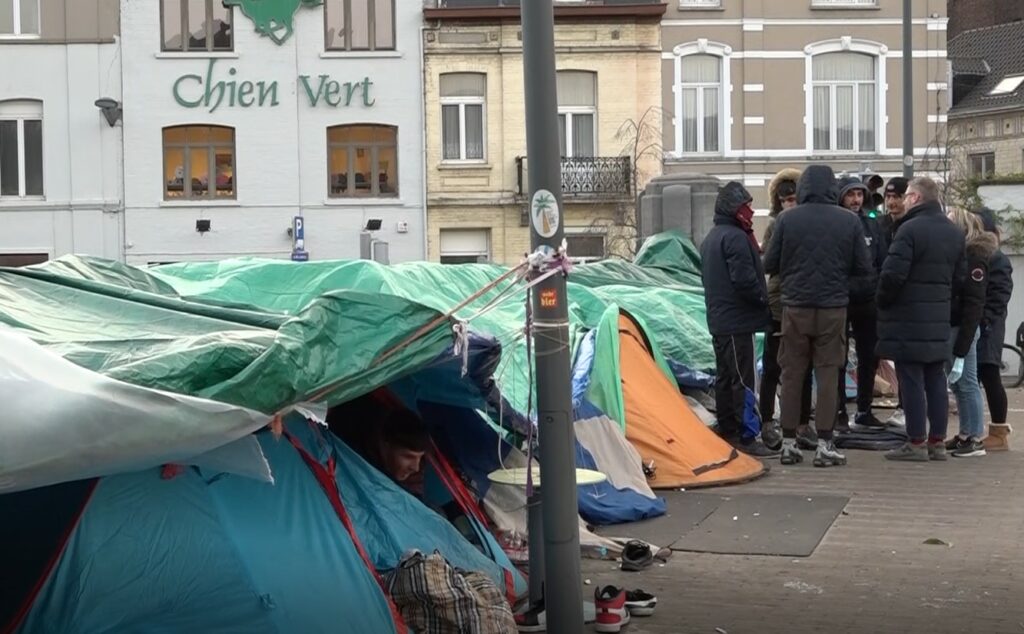Brussels, Sunday evening, 18 December, around six o'clock. The harsh wind cuts through the freezing air. Messi and Mbappé kept each other in check before the eyes of Qatari sheikhs after 90 minutes, but these people don’t care about the World Cup. About a hundred people have gathered on the corner of Rue de l'Avenir and Rue du Chien vert. A dozen local residents hang a banner: "Voisin.e.s Neighbours Solidaires". The other people present are living in the tent camp on the bridge over the canal.
They set up benches and tables, provided by café "Le Phare du Kanaal". Hot soup is served and some logs are stoked in old barbecue sets, like little lighthouses against the cold and darkness. The hot soup is welcome and the atmosphere is calm but also a bit subdued. There is nothing to celebrate. Whoever became world champion football in the meantime is not just an afterthought here.
A few months ago, these people settled in tents on the canal bridge between Brussels City and Molenbeek, a stone's throw from the Little Castle. Why are they sleeping outside in this freezing weather? Is there then no shelter provided somewhere in a warm building? Is this perhaps a protest movement to get residence papers? Have these people perhaps been rejected in the asylum procedure? Have they been ordered to leave Belgian territory? The questions pile up, as do all the benches and tables that are put back against the wall of the café around 8 p.m. The local residents go home, the others retreat to their tents on the bridge. And I cycle home, with half-frozen toes and fingertips.
Tuesday afternoon, December 20, at four o'clock Omid* sits in front of me in café Le Phare du Kanaal. Meanwhile, the bitter frost has given way to incessant, drizzling rain, typical of this time of the year. Omid is an interpreter for schools, Fedasil and many other social organisations. I met him at a political event in Brussels. He was happy to interpret for me today so I can get answers to all my questions. Questions that he himself is also struggling with. We take a few cups of hot tea, and cross the street to the tent camp. Omid strikes up a conversation with a few attendees, who gratefully accept the tea and start telling their stories.
Soon about a dozen Afghan men are standing around us, taking turns answering questions. Yes, they have applied for asylum in Belgium. Look, here is our "Annex 26", a document proving that the application for international protection has been made. Normally, you are then entitled to "bed, bath and bread", but there was none for these people. Had the government not offered them anything then? Well, yes, they had: night shelters in unheated buildings where they had to go outside every morning. Did they have enough to eat? Hardly, but thanks to local residents, they could always get something to get through the day and the freezing night. For several weeks they have been living this way, some even for 5 months. They relieve themselves in the canal, as there are no sanitary facilities, let alone showers to wash themselves.
I don't really understand. Hadn't Prime Minister De Croo and his party chairman Lachaert clearly said that there was shelter for anyone who needed it? "Anyone who wants one will find a place," the latter adamantly pontificated on Twitter. Were these people of ill will then? By camping here on the bridge, did they want to make a statement and put pressure for asylum, as Lachaert also suggested in his tweet? No, these people just want "bed bath bread", but there is nowhere to stay. The Little Castle cannot accommodate them and all other shelters are also occupied. For fear of losing their permanent place by the canal, they also prefer not to go to the night shelter for the homeless. After all, there you are back on the street every morning with no guarantee that there will be room the next night.
However, there is a building in Schaarbeek where many other asylum seekers stay, but the conditions there are terrible. Do you maybe want to have a look there too? The building is half an hour's walk from the tent camp. We walk with a group of five through the Brussels city centre streets via the North Station and the Brabant district to the Rue des Palais. We couldn't have come up with a more ironic street name ourselves. There are no palaces there. Along the way, we meet several other Afghans in the same situation wandering the streets of our capital city. Each time, the greetings are friendly and cordial, with the customary "Assalam aleiykum" (Peace be with you).
The building on Rue des Palais appears to be an empty seven-storey building where the Ministry of Finance must have had offices once upon a time. It was actually meant to house Ukrainian refugees, but the building was gradually taken over by other refugees and asylum seekers who had nowhere else to go. Afghans, Pakistanis, Burundians, Moroccans, Turks and many other nationalities found shelter here in what has de facto become a large squat. There is electricity but no heating and only one shower for an estimated 400 to 800 residents who sleep here on mattresses put on the floor at best.
There is a major lack of hygiene due to inadequate sanitation. There is a pungent urine smell in the corridors and the basement is partly flooded due to a clogged shower. The Afghan men all appear to have served in the Afghan army. Shafi shows photos in which he can be seen with Belgian soldiers, who were stationed in northern Afghanistan. Ramin was a member of the Afghan special forces, which is immediately noticeable by his muscular physique. We are invited along to the Afghans' sleeping quarters.
On the second floor, they have taken one desk space. The room is spotless and decorated with Oriental carpets. Everyone takes off their shoes at the entrance, as is customary in many Asian countries. They have managed to install a lock. This room is their "safe space". They prefer not to go to the higher floors. There are others living there who have succumbed to drugs and alcohol, resulting in aggression and insecurity.
The whole setting reminds me of José Saramago's novel "City of the Blind". In this book, people turn blind one by one, after which they are left to their own devices by the authorities and segregated in separate buildings, ending up in a state of lawlessness.
Yet these people do not surrender to their survival instincts, except those who have fallen prey to drugs and alcohol. No, these people wait with dignity and patience, living from day to day and hoping that one day their courage and perseverance will be rewarded with an acknowledgement of their asylum claim so that they can build a new life.
Today, however, they still live in a legal no-man's land. After all, Belgium has already been condemned thousands of times for not granting "bed bath bread" to people who are entitled to it according to the current procedures. It is like driving 70 kilometres per hour in a 30-km zone thousands of times, getting caught on the speed camera every time, but never being fined. Is that still a zone 30 then?
We go for something to eat together and say goodbye. I wish them "good luck" but the words feel empty. After all, I just return to my life of luxury: a warm room, a warm bed, a hot shower, clean clothes and plenty of food. They are left behind in the cold. All our country's governments look away.
The reason why these people do not get what they are entitled to is at once simple and perverse: their hopeless, inhuman condition serves as a deterrent. There are too many of them, and if their rights are respected, there is a threat of more to come. But the government no longer knows what to do with them. Belgian and European migration policy is hereby officially declared bankrupt.
*All names are fictitious names


